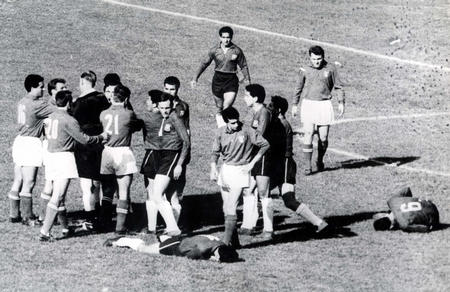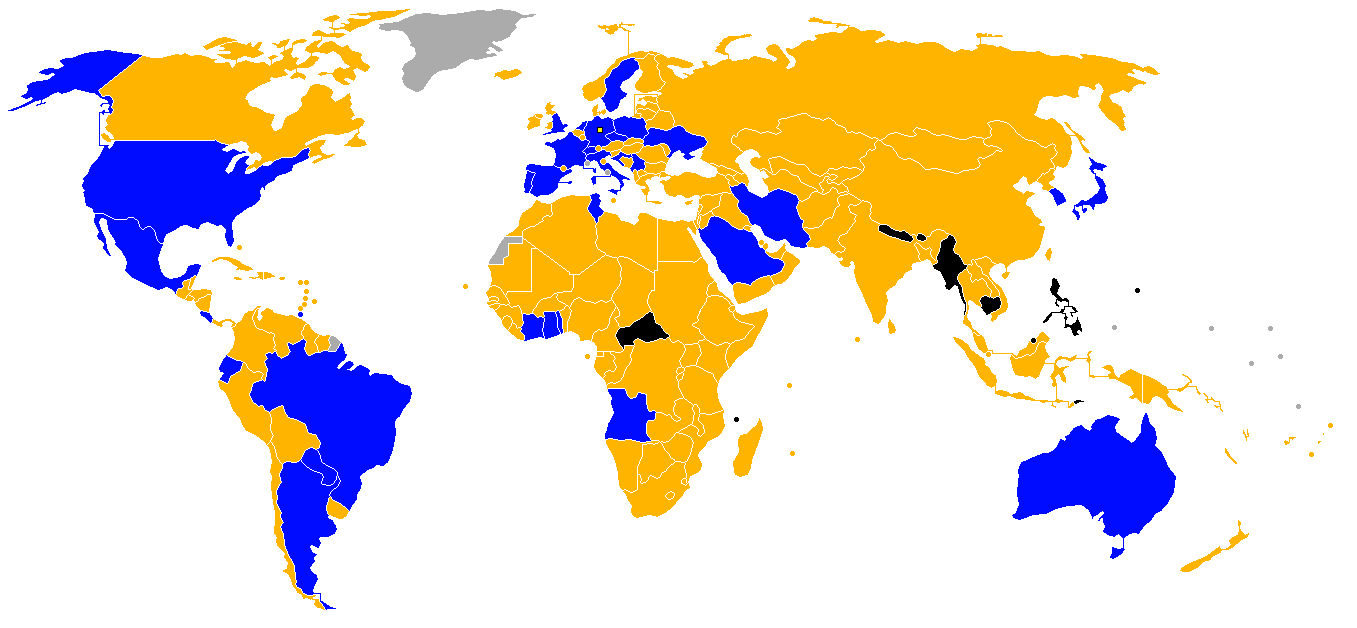|
List Of FIFA World Cup Red Cards
This is a list of all occasions where a football player was sent off from a FIFA World Cup match due to a foul or misconduct, either as a direct expulsion (red card) or as a second caution (yellow card) within the match. This list includes all dismissals since the first World Cup in 1930. The use of physical red and yellow cards to respectively indicate dismissals and cautions is a later invention, having been introduced at the 1970 tournament. Only players are listed, even if they were at the substitutes' bench at the time of the sending off. Managers and other technical staff members are not covered. Statistics * Plácido Galindo was the first player to be sent off in a World Cup match, playing for Peru against Romania in a 1930 match officiated by Alberto Warnken. Although physical red cards were introduced from 1970, they were not put in practice until the 1974 World Cup, when referee Doğan Babacan sent off Chile's Carlos Caszely during a match against West Germany. * ... [...More Info...] [...Related Items...] OR: [Wikipedia] [Google] [Baidu] |
Association Football
Association football, more commonly known as football or soccer, is a team sport played between two teams of 11 players who primarily use their feet to propel the ball around a rectangular field called a pitch. The objective of the game is to score more goals than the opposition by moving the ball beyond the goal line into a rectangular framed goal defended by the opposing side. Traditionally, the game has been played over two 45 minute halves, for a total match time of 90 minutes. With an estimated 250 million players active in over 200 countries, it is considered the world's most popular sport. The game of association football is played in accordance with the Laws of the Game, a set of rules that has been in effect since 1863 with the International Football Association Board (IFAB) maintaining them since 1886. The game is played with a football that is in circumference. The two teams compete to get the ball into the other team's goal (between the posts and under ... [...More Info...] [...Related Items...] OR: [Wikipedia] [Google] [Baidu] |
José Batista
José Alberto Batista González (born 6 March 1962) is an Uruguayan retired footballer who played as a defender, and a manager. He is best known for having received a red card after 56 seconds – a World Cup record – in the 1986 game against Scotland. Club career Born in Colonia del Sacramento, Batista played for a number of clubs in Uruguay and Argentina, starting his career with C.A. Cerro and joining giants Club Atlético Peñarol in 1983. In 1985, he joined Deportivo Español in the latter nation, where he would spend the next decade. Batista made a brief return to his country's top division in 1995, with Rampla Juniors. He spent his final three years with Gimnasia y Esgrima de Jujuy, Deportivo Español and Argentino de Quilmes, the latter in the Argentine second level. International career Batista made a total of 14 appearances for the Uruguay national team, between 1984 and 1993. [...More Info...] [...Related Items...] OR: [Wikipedia] [Google] [Baidu] |
Battle Of Santiago (1962 FIFA World Cup)
The Battle of Santiago ( it, Battaglia di Santiago, es, Batalla de Santiago) was a football match during the 1962 FIFA World Cup, played between host Chile and Italy on 2 June 1962 in Santiago. It gained its nickname from the level of violence seen in the game, in which two players were sent off, numerous punches were thrown and police intervention was required four times. The referee was Ken Aston, who later went on to invent yellow and red cards. Background In this Group B clash, already heightened tensions between the two football teams were exacerbated by the description of Santiago in crude terms by two Italian journalists, and Corrado Pizzinelli; they had written that Santiago was a backwater dump where "the phones don't work, taxis are as rare as faithful husbands, a cable to Europe costs an arm and a leg and a letter takes five days to turn up", and its population as prone to "malnutrition, illiteracy, alcoholism and poverty. Chile is a small, proud and poor country: i ... [...More Info...] [...Related Items...] OR: [Wikipedia] [Google] [Baidu] |
Battle Of Berne (1954 FIFA World Cup)
The Battle of Berne was a football match at the 1954 World Cup between Hungary and Brazil, a quarter-final played on 27 June 1954 at the Wankdorf Stadium in Berne, Switzerland. Violent conduct and fighting prompted English referee Arthur Ellis to send off three players during the match. Fighting between the teams continued in the dressing rooms after the final whistle. Background Brazil had scored six goals in two group games, and Hungary had scored 17. Brazil had a reputation for attractive and attacking football; in their group games, they beat Mexico 5–0, and drew the other 1–1 with Yugoslavia after extra time. Yugoslavia had beaten France 1–0 in their other group game, which meant that both Brazil and Yugoslavia were equal on points in their group. Goal difference was not used to decide who finished top of the group; instead, lots were drawn, with Yugoslavia being elected group winners. Hungary had revolutionized football tactics and coaching in Europe. Their fluid ... [...More Info...] [...Related Items...] OR: [Wikipedia] [Google] [Baidu] |
Battle Of Bordeaux (1938 FIFA World Cup)
The Battle of Bordeaux is an informal name for the World Cup football match between Brazil and Czechoslovakia on 12 June 1938 in the Parc Lescure in Bordeaux, France, one of the quarter-finals of the 1938 World Cup finals. The match had a series of brutal fouls by both sides, due to the lax officiating of Hungarian referee Pál von Hertzka. Overview At the match, which also opened the rebuilt Stade du Parc Lescure, Brazil took the lead 1–0, with Czechoslovakia equalizing on a penalty kick for ball handling by Domingos da Guia. The Brazilian Zezé Procópio was sent off after fourteen minutes. The Brazilian Arthur Machado and the Czechoslovak Jan Říha were sent off just before full time. It was the first time that three players were sent off in a World Cup match, a record that was equaled at the Battle of Berne 1954 between Hungary and Brazil, and exceeded at the 2006 World Cup match between Portugal and Netherlands. Captain František Plánička and Oldřich Nejedlý fro ... [...More Info...] [...Related Items...] OR: [Wikipedia] [Google] [Baidu] |
2006 FIFA World Cup
The 2006 FIFA World Cup, also branded as Germany 2006, was the 18th FIFA World Cup, the quadrennial international football world championship tournament. It was held from 9 June to 9 July 2006 in Germany, which had won the right to host the event in July 2000. Teams representing 198 national football associations from all six populated continents participated in the qualification process which began in September 2003. Thirty-one teams qualified from this process along with hosts Germany for the finals tournament. It was the second time that Germany staged the competition and the first as a unified country along with the former East Germany with Leipzig as a host city (the other was in 1974 in West Germany), and the 10th time that the tournament was held in Europe. Italy won the tournament, claiming their fourth World Cup title, defeating France 5–3 in a penalty shoot-out in the final after extra time had finished in a 1–1 draw. Germany defeated Portugal 3–1 to f ... [...More Info...] [...Related Items...] OR: [Wikipedia] [Google] [Baidu] |
Arturo Brizio Carter
Arturo Brizio Carter (born 9 March 1956) is a Mexican former association football referee. He is mostly known for supervising six matches in the FIFA World Cup, three each in 1994 and 1998. He gave seven red cards ( a record for the tournament) and 29 yellow cards Yellow card may refer to: * Yellow card (sport), shown in many sports after a rules infraction or, by analogy, a serious warning in other areas * Yellowcard, an American alternative rock band * Yellow Card Scheme, a United Kingdom initiative conce ... in those six matches. He was the first referee to wear a coloured uniform in the World Cup. External links * * * * * 1956 births Sportspeople from Mexico City Mexican people of Italian descent Mexican people of English descent Mexican football referees FIFA World Cup referees Copa América referees Living people 1994 FIFA World Cup referees 1998 FIFA World Cup referees CONCACAF Gold Cup referees Olympic football referees {{Mexico-footy-bio-s ... [...More Info...] [...Related Items...] OR: [Wikipedia] [Google] [Baidu] |
Valentin Ivanov (footballer, Born 1961)
Valentin Valentinovich Ivanov (russian: Валентин Валентинович Иванов; born 4 July 1961) is a Russian former international football referee and player. The son of two Olympic champions of 1956, Valentin Ivanov and Lidiya Ivanova, he lives in Moscow where he works as a physical education teacher. As a player, he reached the final of the Soviet Cup in 1983. He speaks Russian and English and became an international referee on 1 January 1997. The first international game he refereed was Luxembourg–Poland in 1999. Before his qualification he served as an assistant referee and officiated 3 games in the 1994 World Cup. He refereed the 2003 FIFA Confederations Cup, UEFA Euro 2004, and 2005 FIFA World Youth Championship. In 2005, he officiated the World Cup qualifiers between Wales and England, and Sweden and Iceland. Both England and Sweden qualified, and were drawn in the same group in the World Cup proper. He was also selected to referee the U ... [...More Info...] [...Related Items...] OR: [Wikipedia] [Google] [Baidu] |


